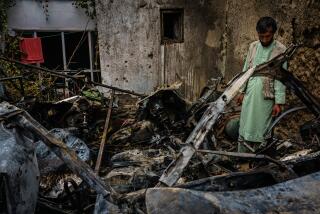Officials Agree on Prisoners’ Status
- Share via
WASHINGTON — President Bush and other top officials said Monday that the administration now is united in its position that the 158 terrorist suspects incarcerated at a U.S. naval base in Cuba are not prisoners of war.
They promised soon to provide the legal reasoning, which they hope will silence criticism over how the detainees are being treated.
After a morning meeting of top foreign policy advisors, Bush and other White House officials sought to end reports that Secretary of State Colin L. Powell was troubled over the murky legal status of the arrestees.
The question centers on whether the suspected terrorists should be treated as prisoners captured in the Afghan war, who cannot be forced to speak to U.S. authorities, or as unlawful combatants who can be interrogated about the whereabouts of Osama bin Laden and any plans for further attacks.
“These are killers,” Bush said, speaking at the White House with interim Afghan leader Hamid Karzai at his side.
Bush: ‘They Know No Countries’
“These are terrorists. They know no countries. The only thing they know about country is, when they find a country that’s been weakened, they want to occupy it like a parasite.”
The president said he would release his legal basis for that definition of the detainees. Other government sources said there would be a separate announcement “in the relatively near future” on the rules for trying the detainees.
Over the weekend, reports surfaced that Powell had asked the White House to consider giving the detainees the Geneva Convention’s prisoner-of-war safeguards. These stipulate that prisoners must be treated humanely and that they cannot be forced to talk.
On Sunday, Defense Secretary Donald H. Rumsfeld visited the naval base at Guantanamo Bay and announced that he had “absolutely full confidence in the way the detainees are being handled and treated.”
He also said that as far as he was concerned, the arrestees being held in outdoor wire cages, until more permanent facilities can be completed, were unlawful combatants and subject to interrogation. “They will not be determined to be POWs,” Rumsfeld said.
‘Spirit’ of Geneva Convention Followed
Powell, who was in Washington, made no public comments Monday. Government sources said he “has supported and does support the decision that Al Qaeda and Taliban fighters are not prisoners of war.”
The president and others stressed that while the detainees were not considered prisoners, they nevertheless were being treated humanely.
“We are adhering to the spirit of the Geneva Convention,” the president said, explaining that even though the government considers the detainees to be international terrorists and enemies of the United States, they will not be abused.
“We’re giving them medical care; they’re being well-treated,” he said. “There’s no evidence that we’re treating them outside the spirit of the Geneva Convention. And for those who say we are, they just don’t know what they are talking about.”
Many civil liberties groups, clergy and legal organizations have complained that the White House is trying to have it both ways. They worry that the administration wants to circumvent the Geneva Convention rules even though most of the detainees were captured while fighting the United States and its allies in the Afghan region.
The groups also have been suspicious that the administration is ignoring tradition and attempting to rewrite how enemy soldiers should be treated once they are captured.
But the White House said Monday that the detainees were simply terrorists--not soldiers in the conventional sense--and that the American public supported anything the government could do to learn about future terrorist attacks.
White House spokesman Ari Fleischer echoed the president’s stance that Al Qaeda is not a recognized government, and that anyone fighting for the terrorist organization should not be considered a traditional soldier.
“For these people who are now detainees, the choice was either be captured or be killed,” he said. “And they’ve been captured.”
At the State Department, spokesman Richard Boucher said government lawyers were searching for the “exact legal interpretation of why they are not prisoners of war.”
“There are different views of that, and so that’s what’s being discussed,” Boucher added.
Sources said that there also would be a decision soon on the fate of the individual detainees, and that they could be tried in military tribunals, turned over to the U.S. federal courts, deported to their home countries or sent to a third country for prosecution.
“It all will be done on a case-by-case basis,” one official said.
More to Read
Sign up for Essential California
The most important California stories and recommendations in your inbox every morning.
You may occasionally receive promotional content from the Los Angeles Times.











